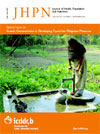
|
The Journal of Health, Population and Nutrition
icddr,b
ISSN: 1606-0997
EISSN: 1606-0997
Vol. 33, No. 2, 2015, pp. 1-8
|
 Bioline Code: hn15033
Bioline Code: hn15033
Full paper language: English
Document type: Research Article
Document available free of charge
|
|
|
The Journal of Health, Population and Nutrition, Vol. 33, No. 2, 2015, pp. 1-8
| en |
High risk of malnutrition associated with depressive symptoms in older South Africans living in KwaZulu-Natal, South Africa: a cross-sectional survey
Naidoo, I.; Charlton, Karen E.; Esterhuizen, TM & Cassim, B.
Abstract
Background: Malnutrition contributes to functional and cognitive decline in older adults, which results in
decreased quality of life and loss of independence. This study aimed to identify determinants of nutritional risk
among community-dwelling adults in KwaZulu-Natal, South Africa.
Methods: A cross-sectional survey was undertaken in 1008 subjects aged 60 years and over who were randomly
selected by systematic sampling. Demographics, socioeconomic data and self-reported history of medical
conditions were recorded. The Mini Nutritional Assessment-Short Form (MNA-SF) was used to screen for nutritional
risk, and the Centre for Epidemiologic Studies Depression scale was administered to all subjects. Descriptive
statistics and the Pearson chi-square and Kruskal-Wallis tests were used for statistical analysis. Logistic regression
modelling determined predictors of nutritional risk.
Results: Of the 984 participants (mean age = 68.8 ± 7.4 years; range 60–103 years) who completed the MNA-SF,
51 % were classified as having a normal nutritional status, 43.4 % at risk for malnutrition and 5.5 % classified as
malnourished. Men were more likely to be either at risk for malnutrition or be malnourished than women (p = 0.008),
as were subjects with a monthly household income of ≤R1600 per month (~133 USD) (p = 0.003). In logistic regression
models, depressed people were 2.803 (p < 0.001) times more likely to be at risk or be malnourished than those not
depressed.
Conclusion: A high prevalence of risk of malnutrition was identified in older South Africans living in an urban area
with poor infrastructure. Further investigations are warranted to determine whether the higher prevalence of
depressive symptomatology in nutritionally at risk individuals is a determinant or a consequence of malnutrition, in
order to develop targeted nutritional interventions in this age group.
Keywords
Nutrition screening; Mini Nutritional Assessment; Elderly; Urban; African
|
| |
© Copyright 2015 - The Journal of Health, Population and Nutrition
Alternative site location: http://www.jhpn.net
|
|
